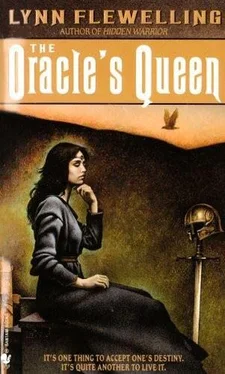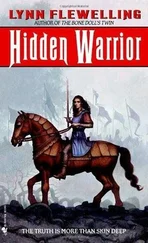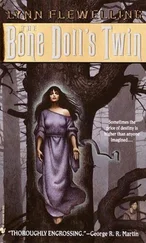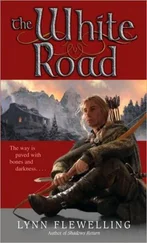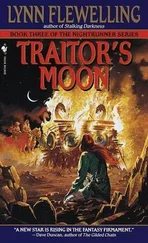That earned an outright laugh from everyone. Everyone except Ki. He’d seen how interested she’d been in the handsome Aurënfaie. He’d tried to ignore it at the time, but to hear her joke of it, like this with all the others sent a fresh twinge of jealousy through him. He shook it off, but for the first time, he had to confront the fact that she must marry someone, and soon. He tried to imagine that and couldn’t. All he could think of was the way she’d looked at Solun, and how it had made Ki want to drive the fellow and his pretty face from the room.
And yet I can’t even kiss her? he thought in disgust . What right do I have to be jealous?
He had little to offer on the subject of architecture or hypocausts, but found his own imagination caught by the thought of seeing a new city take shape, especially one guided by Tamír’s creative mind. She was already thinking about gardens and fountains, as well as defenses. A western capital made military sense, if they could overcome the trade route problem.
“There must be a way to make a good road through the mountains,” he mused aloud as they made camp beside a river in the foothills their third day out. “I suppose it depends on where the city actually is, but there are roads already. I heard Corruth talking about the route they took to Afra. They sailed across from Gedre, but rode the rest of the way.”
“There are several, but not ones suited to trade,” Saruel replied. “And the passes are only open for a few months of the year. The Retha’noi still control some of the better ones, too, and do not welcome outsiders, ’faie or Tír. Anyone with goods to sell must go by boat. There are pirates on both seas: Zengati in the Osiat and brigands of all sorts among the islands of the Inner Sea. And, of course, the clans on the southern coast must go by way of the strait below Riga, a somewhat risky passage in the best of weather. But it’s still safer than the overland route.”
“It’s no better for Skalan trade,” said Tamír. “I don’t suppose it would do to have a capital entirely isolated from the rest of the country.”
Even as she said it, though, Ki could tell by the faraway look in her eyes that she was seeing it anyway, from the fancy sewer channels all the way up to the tall towers of Arkoniel’s house of wizards.
“It would be shorter and safer to go around to the north, if the isthmus wasn’t in the way,” he noted.
“Well, until someone finds a way to move that, I’m afraid we’re stuck with a long sail or bad roads.” Laughing, Tamír turned to Arkoniel. “What do you say? Can your Third Orëska solve that problem for me with your magic?”
To Ki’s surprise, and everyone else’s, Arkoniel just looked rather thoughtful for a moment, then replied, “It’s certainly worth considering.”
Tamír was aware of how Ki was suffering, but there was nothing she could do to help him, or herself. As the days passed and they put the high mountains behind them, she tried to turn her thoughts to other things, but her nights were haunted.
“Where is your mother, Tamír?”
The Oracle’s question had chilled her in that dark cavern, and those words followed her, stained even darker by what Iya had confessed. The Oracle had offered Tamír nothing but silence, yet in that silence she’d sensed expectation.
So, as she and her small entourage neared the crossroads that led to Alestun, she made up her mind. She had to screw her courage, reminding herself that no one but Arkoniel and Ki knew the shameful secret of Brother’s death, or the angry presence in the tower.
“I want to stop at the keep for the night,” she announced as they came in sight of the river road turn.
Tharin raised an eyebrow at that, and Ki gave her a questioning look but no one else seemed more than mildly surprised. “It’s not far out of our way, and it will be better than an inn or sleeping in the open,” she went on, making light of it.
“A day or two difference shouldn’t matter,” said Arkoniel. “It’s nearly a year since you’ve visited there.”
“I can’t wait to see Nari’s face when we ride over the bridge!” Ki exclaimed. “And you know Cook will make a fuss over not having enough food prepared.”
The thought of something as familiar as being scolded by her old cook warmed Tamír, driving away some of her unease over the true task before her. Grinning, she replied, “Probably, but the surprise will be worth a cold supper. Come on, let’s go give them a start!”
She and Ki kicked their horses into a gallop, laughing over their shoulders as the others lagged behind. Tharin soon caught up and there was no mistaking the challenge in his grin. The three of them led the pack, racing each other up the road and thundering by laden carts and startled villagers as they reached the meadows surrounding Alestun.
Tamír looked across the fields to the walled hamlet, standing on a bend of the river. She’d thought it was a city, the first time her father brought her to see it. It wasn’t a completely happy memory; she’d foolishly tried to choose a doll for her name day treat, rather than a proper boy’s toy, and her father been shamed before the whole marketplace. She understood better now why he’d reacted the way he did, but the memory still made her cringe after all these years.
She shook her head, letting the wind in her face scour away the bad feelings. He’d given her Gosie, her first horse that day, as well, and Tharin had given her that first wooden practice sword. All her early memories were like that, a mix of darkness and light, but the darkness always seemed so much greater. Black makes white. Foul makes pure. Evil creates greatness , the Oracle had said. That summed up her life.
They streaked through the forest and came out at last in the broad, steep meadow. On the rise above it, the old keep loomed against the mountains, its square tower pointing like a blunt finger at the sky. Her royal banner flew from a pole on the roof, but that wasn’t what caught her eye.
The tower window that faced the road had lost one of its red-and-white-striped shutters. The other one, weathered and peeling, hung askew by one hinge. It was too easy to imagine she saw a pale face framed there.
Tamír looked away, slowing Midnight to a walk as she took in signs of life all around her.
The meadow had been mown and small haystacks dotted the slope. Sheep and goats grazed around them, cropping the new growth. There were wild geese and swans on the river, and a young servant boy fishing on the bank just below the plank bridge. He jumped up and stared at them as they approached, then bolted for the gate.
The barracks had a new roof, and the herb and flower beds she and Ki had helped Arkoniel plant beside it had been well tended and expanded. Bright flowers blossomed along the edges and there were rows of vegetables, too. Two young girls with baskets on their hips stepped around the corner of the barracks, then darted back out of sight as the boy had.
“Who are all these people?” asked Ki.
“New servants from the village,” Arkoniel told him, catching up in time to overhear. “When I was here with the children, Cook needed more help. It appears she’s hired a few more since I left.”
“And Brother not here to scare them away,” murmured Tamír. Then, whispering to the wizard, “Did my mother trouble them?”
“No,” Arkoniel assured her. “I was the only one who ever saw her.”
“Oh.” Tamír glanced up again, and something else drew her attention: an expanse of blank wall where several windows should have been. “What happened there?”
“Oh that?” said Arkoniel. “I made a few changes a while back, to hide my presence. Don’t worry, it’s only magic. Nothing permanent.”
Читать дальше
Конец ознакомительного отрывка
Купить книгу
